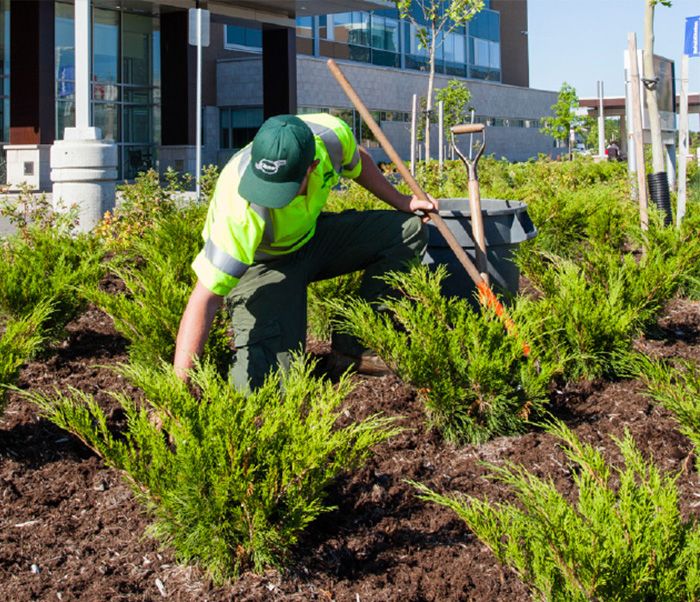Why Mulch? The 11 Benefits of Mulch

Maintaining the landscape on your commercial property requires the constant care and expert upkeep that only Clintar can provide.
As a commercial property owner, you still need to be mindful of keeping the property looking good. One way to do this is by mulching.
Mulching is the act of covering your plants with something to protect them from weeds or pests. It can be as simple as using newspaper on your garden bed, but it can also include composting materials like leaves.
Mulches help conserve water, improve the nutrient status of soil and control weed growth. They also help remove the residual effects of pesticides, fertilizers, and heavy metals.
There are a few types of mulch; living mulch, synthetic mulches, rubber mulch and others but the most common is composted organic matter.
Here are the top 11 benefits of mulching:
1. Reduces water evaporation
By creating a barrier between the soil and the sun’s heat, mulch helps reduce water evaporation and keep your plants hydrated.
Both organic material and inorganic mulches cover the soil and limit water evaporation. With the use of mulch, your landscape beds will retain more moisture, which promotes a healthy garden.
2. Reduces weed growth
The use of mulch helps to limit the amount of those annoying weeds that spring up in the open spaces of your gardens and tree rings. Mulch acts as a barrier between the soil and sunlight, which inhibits the growth of weeds.
Weeds need sunlight to germinate and grow. By applying a layer of mulch, you can help prevent weed growth by blocking out the sunlight.
3. Insulates soil
A lot of the roots of a plant grow in the first few inches below the surface of the ground.
Mulch acts as an insulator for the soil, protecting it from extreme temperatures. This is especially beneficial in the winter when you want to protect your plants from the cold or in the summer when you want to prevent your plants from getting too hot.
In hot weather, mulch helps keep the roots of your plants cooler by insulating them against the heat. In cold weather (like cold nights in the spring), mulch helps prevent the ground from freezing and protects plants’ roots.
4. Improves soil quality
As it breaks down, mulch enriches the soil with essential nutrients like nitrogen, phosphorus, and potassium. Plants rely on these nutrients to thrive and stay healthy.
Mulch also helps the soil retain moisture by preventing water evaporation, keeping the ground moist, and being capable of providing needed nutrients for plant growth. This is especially beneficial in hot, dry climates or during periods of drought.
5. Improves drainage
Mulch can improve drainage in the soil by creating tiny channels that allow water to flow through and reach the roots of your plants. This is especially beneficial in clay soils that tend to be waterlogged.
Good drainage is essential because it allows water to reach the roots of plants and prevents the roots from rotting. Mulch can help improve drainage to prevent plant roots from sitting in water and rotting.
6. Regulates soil temperature
Mulch helps regulate the temperature of the soil, keeping it cooler in the summer and warmer in the winter. This is beneficial for plants because it allows them to tolerate extreme temperatures better.
Temperature regulation is critical because plants need a specific range of temperature to grow. Mulch helps to regulate soil temperature so that plants can grow in both hot and cold climates.
7. Prevents erosion
Mulch can help prevent erosion by holding the soil in place and preventing it from washing away. This is especially beneficial in areas that receive a lot of rain or have steep slopes. By slowing down the impact of raindrops, mulch helps reduce soil erosion.
While the mulch traps water in the soil, it also helps to keep rainwater from washing away your garden’s soil. Mulch helps to break the fall of the water, which lowers the force as the water impacts the ground. This helps to maintain the health of your gardens and keeps them aesthetically pleasing.
8. Attracts beneficial insects
Mulch can attract beneficial insects to your gardens, such as ladybugs and earthworms. These insects help to pollinate plants and improve the quality of the soil.
Earthworms are great for aerating and improving the quality of your soil. Mulch provides the perfect environment for them to thrive.
9. Reduces compaction
Mulch acts as a cushion, preventing compaction from foot traffic or heavy equipment. This is beneficial because it helps to improve the drainage and aeration of the soil.
Keeping soil compaction down to a minimum is crucial for plants because it allows them to better uptake water and nutrients. Mulch helps to reduce compaction, making it easier for plants to thrive.
10. Suppresses disease
Mulch can help to suppress diseases that affect plants by creating a barrier between the plant and the pathogen. This is especially beneficial in areas where soil-based diseases are prevalent.
Common diseases result in root rot, powdery mildew, and brown spot. By using mulch, you can help to prevent these diseases from occurring.
11. Improves the appearance of your landscape
In addition to all its practical benefits, mulch also gives your landscape a polished, finished look. Examples of the best places for mulch include garden beds, around trees and shrubs, and in any areas where you want to control weeds.
Mulch is an important part of keeping your landscapes aesthetic appeal. It can help to give your garden a finished look while also providing various practical benefits like improved draining and protection for your gardens.
A Few Last Thoughts
By reducing the need for watering, weeding, and other maintenance tasks, mulch can also save you time and money in the long run.
Clintar’s experienced landscape technicians are educated in the best practices for applying mulch. Mulch is installed in gardens in a professional manner to promote a healthy growing environment for your plants and trees.
Clintar Commercial Outdoor Services uses organic mulches that contribute to better plant health without having a harsh effect on the environment. Because organic mulch decomposes over time, it is suggested that it be replenished seasonally to provide your plants with maximum benefits.
Mulching is an important part of commercial landscape maintenance, and the benefits are clear. Contact Clintar today to learn more about our mulching services or to schedule a free consultation.












